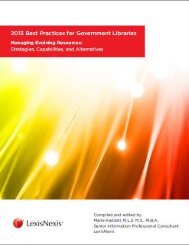2012 Best Practices for Government Libraries
2012 Best Practices for Government Libraries
2012 Best Practices for Government Libraries
Create successful ePaper yourself
Turn your PDF publications into a flip-book with our unique Google optimized e-Paper software.
235<br />
BEST PRACTICES <strong>2012</strong><br />
Encouraging users to use search engines other than Google is another way to<br />
assist users to be more self-reliant internet searchers. Bingle (http://bingle.nu/) is<br />
good <strong>for</strong> showing users the different results when searching using Google and Bing.<br />
It presents side-by-side, on separate panes on one screen results in their native<br />
search environments. Bingle is aware that in some parts of the world (like in<br />
Australia) you cannot see Google search results (you used to). Providing these tools<br />
as a solo does saves you time and enables you to offer more in-depth specialized<br />
research services to other users.<br />
The Catalogue<br />
A tool that is often overlooked as a time-saver and assisting people to find<br />
in<strong>for</strong>mation is the catalogue. For whatever reason, the catalogue is often the last<br />
place people search <strong>for</strong> in<strong>for</strong>mation. Often the search page is not very intuitive <strong>for</strong><br />
users. Whether one subconsciously takes on the general idea that more relevant<br />
and useful in<strong>for</strong>mation is out there on the internet and the library has only old<br />
“stuff” or some other reason, this attitude can diminish the value of the catalogue.<br />
This type of thinking has led to the barest minimum of in<strong>for</strong>mation being recorded,<br />
so that the catalogue becomes a poor tool <strong>for</strong> in<strong>for</strong>mation retrieval. The rationale<br />
behind this type of thinking is that time is saved <strong>for</strong> the provision of 'visible' or<br />
interactive library services that are seen of higher “marketable value’ than<br />
catalogue records. Cataloguing is seen as a “backroom” task not very important to<br />
adding to the value of the “frontline” library services. This is a false saving as the<br />
recording of more detailed in<strong>for</strong>mation especially internal departmental documents<br />
in a catalogue record does assist in the retrieval of unique and hard-to-find<br />
in<strong>for</strong>mation. This does add significant value to the library service.<br />
No longer should the library catalogue be seen as just an inventory of items<br />
retained in the collection, but a tool <strong>for</strong> resource discovery with records linking to<br />
items and resources external to the collection. Even more so now with digitally<br />
born documentation, catalogues can be used to enhance in<strong>for</strong>mation retrieval<br />
through using metadata, in-house taxonomies, ontologies, etc.<br />
Depending on in<strong>for</strong>mation environment you work in, the catalogue can be used<br />
in other ways to assist in searching <strong>for</strong> in<strong>for</strong>mation. When working in an area where<br />
there are no commercial bibliographic databases that cover the department’s core<br />
business, consider cataloguing in<strong>for</strong>mation rich websites <strong>for</strong> inclusion into the<br />
library catalogue. This is a way of making the deep or invisible web in<strong>for</strong>mation<br />
more visible to users. The websites catalogued would include those with grey<br />
literature or in<strong>for</strong>mation that search engines such as Google cannot uncover. This<br />
enhances the value of the content of the catalogue. You can then provide links from<br />
the catalogue to customised search engines, <strong>for</strong> the websites that can be searched<br />
by Google, etc. with a link “Search this or similar websites” It is also a way of<br />
keeping a history of websites. Often when organisations change or merge the<br />
website URL changes. Keeping a record can assist in future searching of the<br />
Internet Archive (www.archive.org) or other web archives. If making records of<br />
in<strong>for</strong>mation rich websites is not relevant to your work situation consider adding the<br />
URL of the websites to author authority records to keep track of URL changes as a<br />
research tool.



